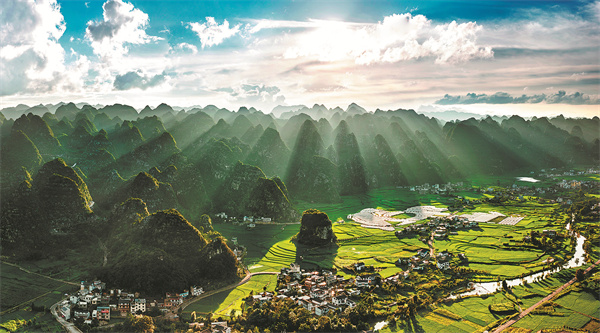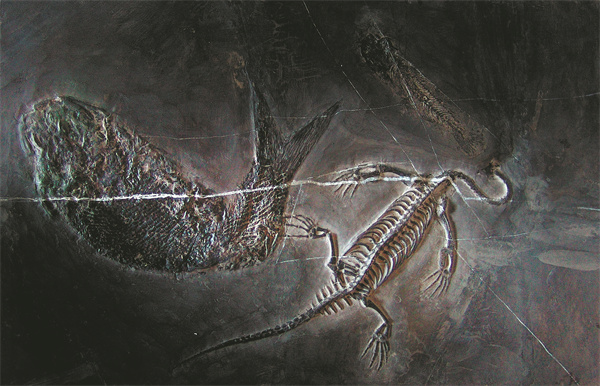Uncovering Xingyi's unparalleled allure


Wanfenglin Scenic Area. [Photo provided by Zhang Ting/China Daily]
"Three years ago, my partner and I ventured across 80 percent of China's provinces in our RV. It was in January 2021 that we first set foot in Xingyi, a visit that spanned nine days," says Wei Chen, a social media influencer.
The couple discovered they had numerous connections to Xingyi, a medium-sized city in southwestern China's Guizhou province. A second visit the following year confirmed their love for the area. They made a life-changing decision to sell their house in Xi'an, the capital city of Shaanxi province, and start anew in Xingyi.
For the couple, Xingyi's exceptional accessibility stands out among its many allurements. Situated at the pivotal meeting point of Guizhou, Yunnan, and Guangxi provinces, Xingyi has long been a bustling nexus of commerce and a crucial corridor in the tri-provincial region. With high-speed rail on the horizon and a fully serviced airport, the city is remarkably accessible.
They further highlighted the city's climate advantages, noting, "The weather here is mild, avoiding the harsh cold of winter and the extreme heat of summer. In January, daytime temperatures can reach up to 20 degrees Celsius."

Wanfeng Lake Castle (Jilong Castle). [Photo provided by Zhang Ting/China Daily]
Xingyi's appeal extends beyond its climate and geopolitical location. Karst mountains reach toward the sky like ten thousand fingers grasping at clouds. Sculpted solely by the forces of nature into a "Karst Museum", Xingyi offers an array of landscapes that seem crafted by divine intervention: cone peaks, deep gorges, hidden valleys and secretive caves.
Xingyi's rich tapestry of geological landscapes led to the establishment of the Xingyi Geopark. It centers around significant historical sites of marine reptile fossils, crucial for understanding biological evolution, and a monumental karst landscape featuring cone-shaped peaks and soluble rock formations. The geopark spans an impressive area of 1,456.10 square kilometers and encompasses renowned attractions like the Maling River Canyon Scenic Area, Wanfeng Lake, Wanfenglin Scenic Area, Nidang Stone Forest, and Dingxiao Guizhou Dragon Scenic Area.
Xingyi's designation as a national geological park holds a special place in Wei's heart, particularly because it is the discovery site of the "Guizhou Dragon", a prehistoric marine reptile. "Seeing dragon motifs around the city feels like a personal connection for me, being born in the year of the dragon," she explains.
For those interested in geology and paleontology, Xingyi does not disappoint. The geopark enables one to explore the Triassic Period fossil sites that have contributed significantly to understanding prehistoric life on Earth.
Guizhou Daily reports that during the 2024 Dragon Year, "Dragon Year, Seeking Dragons" has become a popular topic at the Xingyi Geopark Museum.
According to statistics, the museum has welcomed approximately 20,000 young people for study visits this year.

Guizhou Dragon and Sichuanosuchus shuhanensis fossils. [Photo provided to China Daily]
"This is an ammonite, where you can clearly see the patterns, with ancient organisms imprinted on it, making it a tangible fossil," explains the fossil restorer Wang Yunzhong as he patiently instructs a group of young students on how to remove the mud and sand enveloping the rock layers.
"As fossil restorers, we hope to use our thorough and patient service to help visitors experience the story of evolution from more than 200 million years ago," he adds.
Zheng Xiumin, the director of the museum, told Guizhou Daily that the ancient biological fossils here record the historical archives of the Triassic period. They prove that Guizhou used to be an ocean inhabited by marine animals which roamed the Earth 100 million years before the appearance of dinosaurs. Meanwhile, ancient fish thrived with ubiquitous blooming sea lilies.
On March 27, the Xingyi Geopark was approved for inclusion in the Global Geoparks Network, making it Guizhou's second geopark to achieve prestigious world-class recognition, following the success of the Zhijindong Cave National Geopark.
"This is incredible! It presents a great development opportunity for Southwest Guizhou. I hope its fame will be enhanced and recognized both domestically and internationally," shares Wei excitedly.
"The Xingyi Geopark encompasses seven major categories of geological relics. Its unique paleobiological group value is unparalleled among global geoparks. This is especially true for the Triassic paleontological fossil exposure and burial areas, which fill a gap in the Global Geoparks Network," says Yu Chun, the Chief of the Natural Conservation Area Service Department of the Forestry Bureau of Qianxinan and a senior engineer.
"To enhance the global appeal and educational impact of our geopark, we are selecting young talent proficient in foreign languages to be promotional ambassadors and guides. Moreover, in line with the standards of global geoparks, we are updating and improving the bilingual signage throughout the park, making it more accessible and informative for domestic and international visitors," Yu further notes.
MOST POPULAR
- 1 China to ease investment restrictions further for foreign firms
- 2 2024 year in review: China's exhibition highlights
- 3 Chinese customs unveils measures to boost development of western regions
- 4 Beijing opens airport service counters for foreign travelers
- 5 China accelerates efforts to build unified national market
Editors' Picks
 Infographic:
The reform and opening-up policy unleashes vitality
Infographic:
The reform and opening-up policy unleashes vitality
 Infographic:
Milestones in China's high-speed railway development
Infographic:
Milestones in China's high-speed railway development





